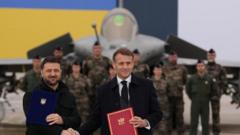Could Ukraine Soon Acquire 100 French Rafale Fighter Jets?

Published: 2025-11-17 20:00:08 | Category: world
The recent agreement between Ukraine and France to procure up to 100 Rafale F4 fighter jets marks a significant enhancement in Ukraine's military capabilities amid ongoing Russian aggression. This deal, announced by Ukrainian President Volodymyr Zelensky and French President Emmanuel Macron, aims to bolster Ukraine's air defence systems and ultimately protect its sovereignty. With the Rafales set for delivery by 2035, Ukraine is preparing to strengthen its military infrastructure in the face of heightened threats from Russia.
Last updated: 09 October 2023 (BST)
What’s happening now
In a landmark agreement, Ukraine has secured a commitment from France to supply up to 100 Rafale F4 fighter jets alongside advanced air defence systems. This initiative comes as Russia amplifies its missile and drone attacks on Ukraine, targeting key infrastructure and resulting in civilian casualties. The deal was formalised during President Zelensky's visit to Paris, where he highlighted the strategic importance of the Rafales in enhancing Ukraine's defence capabilities. Along with the jets, Ukraine will receive sophisticated French radars and air defence systems, which are critical for countering the ongoing aerial threats from Russia.
Key takeaways
- Ukraine will acquire up to 100 Rafale F4 fighter jets from France.
- The delivery timeline extends to 2035, with immediate production of interceptor drones beginning this year.
- Financial arrangements are still under discussion, including potential funding from the EU and the use of frozen Russian assets.
Timeline: how we got here
The progression toward this significant military cooperation can be outlined as follows:
- February 2022: Russia launches a full-scale invasion of Ukraine, capturing approximately 20% of Ukrainian territory.
- Throughout 2022: Ukraine receives military aid from various Western countries, including France and the US.
- October 2023: Ukraine and France formalise an agreement for the procurement of Rafale F4 jets.
What’s new vs what’s known
New today/this week
The recent announcement of the Rafale jet deal represents a significant escalation in military support for Ukraine. It highlights the commitment of Western allies to bolster Ukraine's defence capabilities against Russian attacks, particularly as the conflict shows no signs of abating. The deal also includes advanced air defence systems, which are crucial given the increased frequency and intensity of Russian aerial assaults.
What was already established
Prior to this agreement, Ukraine was already utilising French Mirage aircraft and had secured commitments for US-made F-16s. The military landscape in Ukraine has been evolving with various nations pledging support, but the scale and timeframe of this new deal underscore a more robust and long-term military partnership with France.
Impact for the UK
Consumers and households
The ongoing conflict in Ukraine has far-reaching implications for UK consumers, particularly concerning energy supplies and prices. As Ukraine secures more military support, the likelihood of sustained conflict may impact energy markets, potentially leading to higher prices for consumers in the UK as European nations grapple with energy security.
Businesses and jobs
For UK businesses, particularly those linked to defence and aerospace sectors, the Rafale deal may present new opportunities for collaboration and supply chain development. However, prolonged instability in Ukraine could disrupt trade routes and impact imports and exports. Companies involved in military contracts may see an uptick in demand for related services and products.
Policy and regulation
The UK government is likely to maintain close communication with allies in the EU and NATO regarding military support for Ukraine. As discussions around the use of frozen Russian assets for military financing progress, the UK may need to address its own legal frameworks and policies concerning international law and financial sanctions.
Numbers that matter
- Up to 100 Rafale F4 fighter jets set to be delivered to Ukraine by 2035.
- Estimated 6000 glide bombs used monthly by Russian forces against Ukrainian targets.
- Ukraine currently controls about 80% of its territory despite ongoing hostilities.
- Approximately €140bn (£123bn) of Russian assets are currently frozen in the EU, pending discussions on their potential use for supporting Ukraine.
Definitions and jargon buster
- Rafale F4: A multirole combat aircraft developed by French company Dassault Aviation, known for its advanced avionics and capability in both air-to-air and air-to-ground operations.
- EU: The European Union, a political and economic union of 27 member states located primarily in Europe.
- Interceptor drones: Unmanned aerial vehicles designed to intercept and destroy incoming threats, such as missiles or enemy aircraft.
How to think about the next steps
Near term (0–4 weeks)
In the immediate future, watch for further announcements regarding the financial details of the Rafale deal, as well as any additional military aid that may come from other Western allies. The Ukrainian military's preparation for integrating these new systems will likely be a focal point in discussions.
Medium term (1–6 months)
As the agreement progresses, the focus will shift to the training and logistical support required for Ukraine's military personnel to effectively operate the Rafale jets and associated systems. Additionally, the ramifications of the EU's financing decisions regarding frozen Russian assets will be crucial to monitor.
Signals to watch
- Updates on military training schedules for Ukrainian pilots and support crews.
- Discussions within the EU regarding financial assistance and the use of frozen Russian assets.
- Changes in Russian military strategy or tactics in response to the enhanced capabilities of the Ukrainian air force.
Practical guidance
Do
- Stay informed about ongoing military developments in Ukraine through reliable news sources.
- Understand the potential implications of military support for energy prices and availability in the UK.
Don’t
- Assume that military hardware alone will resolve the conflict without adequate training and support.
- Overlook the economic ramifications of the ongoing war, particularly in relation to energy supply chains.
Checklist
- Review recent developments in military aid to Ukraine.
- Monitor financial decisions regarding EU support for Ukraine.
- Assess the implications of military advancements on UK energy prices.
- Stay updated on Russian military tactics and strategies.
Risks, caveats, and uncertainties
While the agreement for Rafale jets is a significant step for Ukraine, the actual impact will depend heavily on the training, logistics, and support mechanisms that accompany the deal. Furthermore, the financial aspects remain uncertain, particularly regarding the controversial proposals to utilise frozen Russian assets, which could face legal challenges and differing opinions among EU member states.
Bottom line
The acquisition of Rafale fighter jets represents a critical enhancement of Ukraine's military capabilities amid ongoing Russian aggression. However, the success of this agreement will hinge on effective training and logistical support, as well as the resolution of financial complexities. For the UK, the broader implications on energy security and economic stability will remain key considerations as the conflict continues.
FAQs
What are the Rafale F4 fighter jets?
The Rafale F4 is a multirole combat aircraft from France, designed for various operations including air-to-air combat and ground support. Its advanced technology will enhance Ukraine's air defence capabilities.
When will the Rafale jets be delivered to Ukraine?
The delivery of the Rafale F4 jets is planned to be completed by 2035, with production and preparation processes starting in the near term.
How will financial support for Ukraine be structured?
Financial arrangements for the Rafale deal are still being discussed, with potential funding sources including EU financing and the controversial use of frozen Russian assets.



